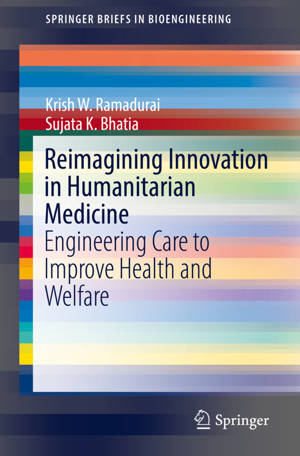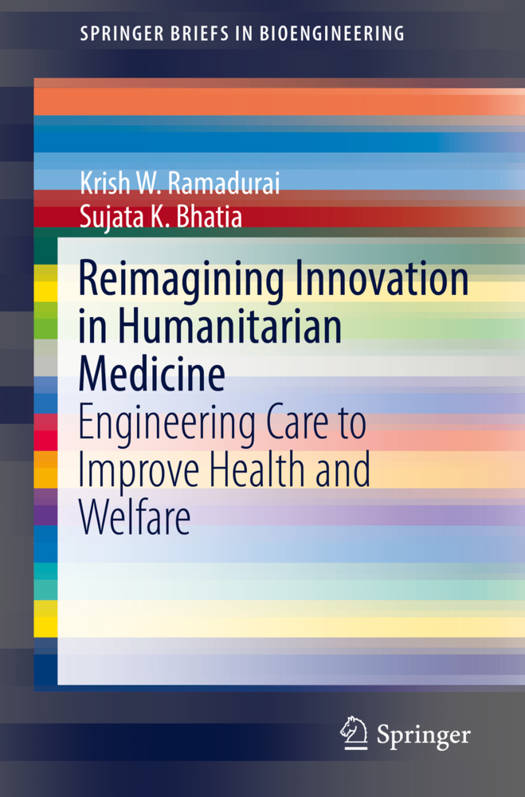
Bedankt voor het vertrouwen het afgelopen jaar! Om jou te bedanken bieden we GRATIS verzending (in België) aan op alles gedurende de hele maand januari.
- Afhalen na 1 uur in een winkel met voorraad
- In januari gratis thuislevering in België
- Ruim aanbod met 7 miljoen producten
Bedankt voor het vertrouwen het afgelopen jaar! Om jou te bedanken bieden we GRATIS verzending (in België) aan op alles gedurende de hele maand januari.
- Afhalen na 1 uur in een winkel met voorraad
- In januari gratis thuislevering in België
- Ruim aanbod met 7 miljoen producten
Zoeken
Reimagining Innovation in Humanitarian Medicine
Engineering Care to Improve Health and Welfare
Krish W Ramadurai, Sujata K Bhatia
€ 69,95
+ 139 punten
Omschrijving
Throughout history, humanity has been plagued by a myriad of humanitarian crises that seemingly take the form of perpetual human suffering. Today, approximately 125,000,000 people require humanitarian assistance as the result of famine, war, geopolitical conflict, and natural disasters. A core component of this suffering is afflictions related to human health, where disturbances strain or overwhelm the existing healthcare infrastructure to create the conditions for an increase in morbidities and co-morbidities. One of the more startling elements is the loss of life to preventable medical conditions that were not properly treated or even diagnosed in the field, and is often due to the limited interventional capacity that medical teams and humanitarian practitioners have in these scenarios. These individuals are often hindered by medical equipment deficiencies or devices not meant to function in austere conditions.
The development of highly versatile, feasible, and cost-effective medical devices and technologies that can be deployed in the field is essential to enhancing medical care in unconventional settings.
In this book we examine the nature of the creative problem-solving paradigm, and dissect the intersection of frugal, disruptive, open, and reverse innovation processes in advancing humanitarian medicine. Specifically, we examine the feasible deployment of these devices and technologies in unconventional environments not only by humanitarian aid and disaster relief agencies, but also by crisis-affected communities themselves. The challenge is complex, but the financial support and technical development of innovative solutions for the delivery of humanitarian aid is a process in which everyone is a stakeholder.
The development of highly versatile, feasible, and cost-effective medical devices and technologies that can be deployed in the field is essential to enhancing medical care in unconventional settings.
In this book we examine the nature of the creative problem-solving paradigm, and dissect the intersection of frugal, disruptive, open, and reverse innovation processes in advancing humanitarian medicine. Specifically, we examine the feasible deployment of these devices and technologies in unconventional environments not only by humanitarian aid and disaster relief agencies, but also by crisis-affected communities themselves. The challenge is complex, but the financial support and technical development of innovative solutions for the delivery of humanitarian aid is a process in which everyone is a stakeholder.
Specificaties
Betrokkenen
- Auteur(s):
- Uitgeverij:
Inhoud
- Aantal bladzijden:
- 105
- Taal:
- Engels
- Reeks:
Eigenschappen
- Productcode (EAN):
- 9783030032845
- Verschijningsdatum:
- 23/01/2019
- Uitvoering:
- Paperback
- Formaat:
- Trade paperback (VS)
- Afmetingen:
- 156 mm x 234 mm
- Gewicht:
- 176 g

Alleen bij Standaard Boekhandel
+ 139 punten op je klantenkaart van Standaard Boekhandel
Beoordelingen
We publiceren alleen reviews die voldoen aan de voorwaarden voor reviews. Bekijk onze voorwaarden voor reviews.









